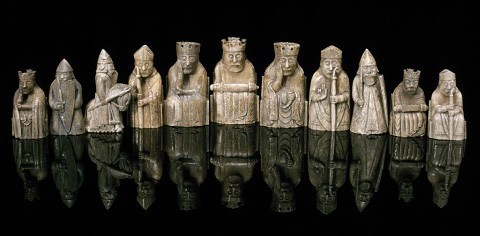Tuesday, June 3, 2014
Medieval Chess reflects much about Medieval society
The modern game was developed in the Medieval period
by Ferdinand III

Chess in some variant of the modern form, was being played in India by 300 AD. It was spread along trade routes and brought to Europe by the Moslem Jihad, which slaughtered millions of Christ-followers; and forcibly converted millions of other Christians to the moon cult of Mecca. The Medieval European culture took this gift from the 'Moors' and as with so many other concepts, adapted, improved and utilized it.
The chessboard is really a miniature scale model of the Medieval European world. Pawns represent serfs, who were not slaves in any sense, and much better off as peasants in Medieval Europe, than as beggars or slaves under the Roman empire. Serfs were tied to a liege lord who rented to them their land and in exchange gave his military protection to the farmers and their families. It was a sensible solution and social compact in an age of Moslem, Viking and Avar invasion. For most of Medieval history, with the exception of England and Normandy, centralized control over 'regions' was limited, and it was the local response to attacks and raids which was paramount.
Knights of course represent the landed aristocracy, trained by birth in many regions of Medieval Europe to fight. Castles are the abodes of the nobility and owners of property. The Bishop is more powerful than the Knight and is closer to the royalty of the King or Queen. This reflects the cultural and at times political power of the Church. In good Medieval fashion, the King is the main object to take or defeat in the game of chess, being the most important personage in society. His consort the Queen, is the most powerful piece of the game, able to move on the board with a great degree of latitude and flexibility. Take the Queen from your chess opponent and you stand a good chance at winning the game.
Chess refracts the many and diverse aspects of Medieval society and its intellectual development. A 'dark age' would not invent and disseminate a mentally challenging game; nor would it adapt the contest to represent the real world and its structure of power and hierarchy. Chess is quintessentially Medieval.